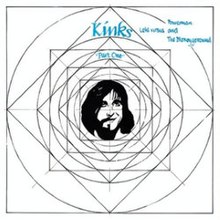Lola versus Powerman and the Moneygoround, Part One
| Lola Versus Powerman and the Moneygoround, Part One | ||||
|---|---|---|---|---|
 |
||||
| Studio album by The Kinks | ||||
| Released | 27 November 1970 | |||
| Recorded | April–May and August–September 1970 at Morgan Studios, Willesden, London | |||
| Genre | Rock | |||
| Length | 40:25 | |||
| Label | Pye (UK), Reprise (US) | |||
| Producer | Ray Davies | |||
| The Kinks chronology | ||||
|
||||
| Singles from Lola Versus Powerman and the Moneygoround, Part One | ||||
| Professional ratings | |
|---|---|
| Review scores | |
| Source | Rating |
| Allmusic | |
| Blender | |
| Robert Christgau | B− |
Lola Versus Powerman and the Moneygoround, Part One, commonly abbreviated to Lola Versus Powerman, or just Lola, is the eighth studio album by British rock band the Kinks, recorded and released in 1970. A concept album, it is a satirical appraisal of the music industry, including song publishers, unions, the press, accountants, business managers, and life on the road. Musically Lola Versus Powerman is varied, described by Stephen Thomas Erlewine as "a wildly unfocused but nonetheless dazzling tour de force", containing some of Ray Davies' strongest songs.
Although it appeared during a transitional period for the Kinks, Lola Versus Powerman was a success both critically and commercially for the group, charting in the Top 40 in America and helping restore them in the public eye, making it a "comeback" album. It contained two hit singles: "Lola", which reached the top 10 in the US and UK, and "Apeman", which peaked at number five in the UK.
The Kinks ban by the American Federation of Musicians on performing in America, which had been in force since 1965, was lifted in 1969, so the group's management arranged a North American tour. However, members of the band fell ill, and the tour was shuffled, resulting in the band playing only a few dates in America and Canada. A follow-up tour in 1970 met with similar results, with the group performing at only a select number of venues, with many dates cancelled. The down time between the tours allowed Ray Davies, lead singer and songwriter of the group, to develop the band's next single, "Lola".
The Kinks returned to England to start work on their new LP in spring 1970. The group used Morgan Studios, an independent studio in Willesden, London, which was a change for them. They would continue recording their albums there until Preservation, when they switched to their newly purchased studio, Konk. Recording began in late April/early May. Some of the first songs recorded were "Lola", the outtake "The Good Life", "Powerman" and "Got to Be Free". The sessions for "Lola" were especially long, and the recording continued into late May. Davies would recall later how he achieved the signature clangy sound at the beginning of the track:
...
Wikipedia
